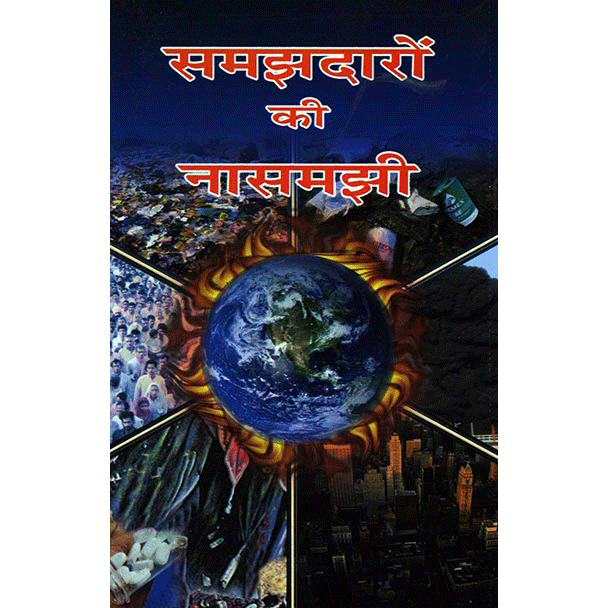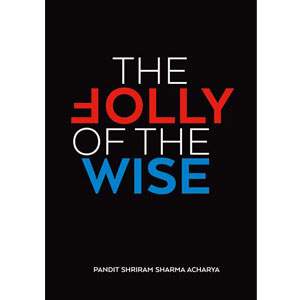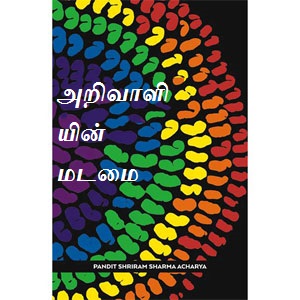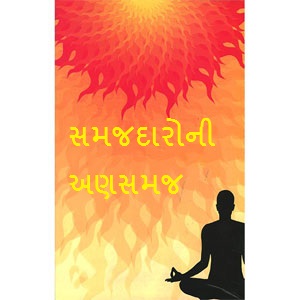Folly of the wise 
The Agonizing Walls of Division and Discrimination
Read Scan Version
In this world there are many species of organisms. Their form differs to some extent across regions but they are still known by the same name. Animals like Elephants, Horses, Donkeys, Oxen etc, and birds like Peacocks, Pigeons, Ducks, Swans etc, are known by the same name all over the world. Snakes, Scorpions, Ants, Termites etc, also are different species and wherever they belong, they are still known by the same name. Man is also one such organism. Wherever he may stay in this world, whatever language he may speak, there may be drastic variations in his body-built, complexion and facial features too but he will still be known as man. They all belong to the single species known as Homo sapiens in zoological terms and commonly as human beings. Organs of all human beings are similar. Wherever he stays, whatever may the skin of his colour be but he will always belong to the single class – ‘human beings’.
Another identity of every species is that it can reproduce only within its class. Organisms belonging to different class cannot mate and will not be able to reproduce. Had there been different classes of human beings they would not have been able to mate or reproduce. But, such differences are not seen anywhere. Hence, their class has to be the same.
According to the region, weather and family traditions, one may attain black, white or brown skin. There may also be some differences in the structure of the faces but that doesn't mean they belong to any class other than human beings.
In spite of this fact, people have created their own special classes in the name of country, region, faith (ethnic group), language and so on for example, Bengali, Tamil, Punjabi, Chinese, Japanese etc. On the basis of language also such divisions have been formed. But, these are not real. The natural oneness cannot be split into such sections.
Racism in India is bizarre. When in the ancient times the social engineering system of four varnas (social classes) was put in place, it was based on the nature of one’s natural attitude and business or work that he naturally liked and performed. They were classified broadly as teachers, warriors, businessmen and artisans. This classification was temporary and not static. There had always been the freedom to change profession. On this basis anyone could change his class, whenever one desired. Even today this classification based on profession exists. Organizations are also formed on this basis. Members of Kisan Sabha (Assembly of Farmers), Shramik Sangh (Labour Union), Vyapaari Mandal (Business Circles), Adhyapak Sabha (Institution of Teachers), Rikshaw Union etc, are those who are engaged in the corresponding profession. Class changes when the profession changes. One who is a teacher may later join the armed forces. Upon retirement one may start his own business. This way one's class may keep changing with time. But, he will still continue to belong to the specie of human beings. Even the family would also remain the same. Social class or caste of a person may be changed multiple times but from the perspective of human affection and cooperation, there will continue to be a unity amongst all. For example, “voter” belongs to a single class irrespective of where he stays and whatever business he conducts.
This simple equation has been immensely complicated in the dark age of medieval times. In these times of cultural decline, religious-anarchy and political-disturbances, society was divided into classes as ‘castes’ based on birth and clans. It might have been fine if things remained there. But, when discrimination started based on caste or creed, then that brought the onslaught of nepotism. Classes got divided into sub-classes and countrymen got divided into communities. Some class of people started considering themselves to be superior to others based on their caste. Classification based on qualities, work and character is plausible but classification based on caste and discrimination on that basis can only be termed shameful and shocking.
This mindless classification is beginning to mature into a tradition now. Every community has many sub-classes and each sub-class believes itself to be “the” supreme class and discriminate against others. The classes of Brahmins (class of religious teachers), Kshatriyas (warrior class), Vaishyas (business class) etc, have now become castes defined by birth (family lineage). Within each there are many sub-classes. People belonging to these sub-classes do not mingle with each other, moreover they restrict their social interactions, marriages etc to within their sub-class. Only people from the same sub-class are invited to any social festivities that are organized. People joining the marriage processions also often need to belong to the same sub-class. This parochialism is settling in to business and politics as well. Even while casting vote, people give undue consideration to the ‘caste’, creed and community of the candidate. More importance is attached to these ‘labels’ of a candidate than to his qualifications and honesty.
The practice of such division and discrimination has caused heavy damage to the whole society. Society was already afflicted with discrimination due to language, regionalism and communalism. Addition of discrimination based on caste has made the system scornfully ugly. We are Indians only for the namesake but going by our blind convictions and communal divisions it seems we are continuously disintegrating the strength that lies in our unity. Externally, an Orange is one fruit but when we peel its skin, it seems that there are numerous particles inside that are different from one another. This is a sad and unfortunate situation of our society today. As if this was not enough, the menace of racism is catching on as well. The rise of parochialism and bigotry is fragmenting and weakening us further. Under these circumstances, survival of the strength that lies in our seemingly infallible unity looks difficult.
Root-Cause of Our Social Evils and Backwardness:
With the onslaught of casteism, the custom of alienating others and humiliating them begins to take roots. This parochialism has far-reaching ill effects. People start putting efforts to stack up greater benefits for their narrow community in business, jobs and elections. This evokes similar reaction from others. They adopt the policy of giving tit for tat and this deepens the divide even further. Later this venom results in quarrels, testimonies, and litigations. One loses the eye for justice and ethics. Casteism, communalism and regionalism dominate the behaviour of most people today. Matters come to a head when people start plotting to capture power and rule by creating a majority of their own class. Disregarding the well-established propriety in arresting the population explosion, people start believing in having more and more children belonging to their own class in order to augment their vote bank and enable a win for their candidate. And then they profit under this candidate's patronage. Clearly when one class starts getting more benefits and the inappropriate side prevails then it is sure to evoke a reciprocal reaction. The vicious cycle continues and spreads more hatred, corruption, nepotism and so on….
Everyone knows that there is great strength in unity and there are great benefits of it. If threads of a cloth get scattered then that cloth becomes useless. Nations that are built upon the strength of unity, prosper rapidly and easily cross all difficulties even if they are tiny nations like Japan and Israel. But, in the nation where there are large differences, all the energy gets spent on petty disputes. They are plagued by jealousy, malice, vengeance, which in the end harm everyone.
In our country, marriages are also associated with casteism. People want to marry their sons and daughters within their community. Division within smaller and smaller sub-classes has greatly reduced the spread of these classes. In that limited spread, it is difficult to find a right match for the boys and girls. In desperation one has to compromise and select out of the limited options. There is high demand for the qualified ones. This has been the major cause of the curse of dowry and hence of corruption in our society. Moreover, because of limited choice within a small ‘community’ one is forced to choose amongst the inept ones. It is therefore seen that people compromise and go for an inept match. If the extent of the search was larger and beyond the community, then there would not have been the need to struggle this much, indulge in adulation or pay dowry.
Good match could have been found in the neighbourhood itself. There would have been sufficient information about their nature and traditions and marriages would have been more successful. But, when one is entangled within the community, one needs to look afar and then real information about the state of that family or the nature of the boy or girl is not available. One has to shoot in the dark and that mostly yields unsuitable results. The problem of finding the right match for marriage gets complex in the wake of restrictions to search within the community. Its solution was simple. If caste distinctions were not allowed to get in the way, relations could have been easily and cheaply formed without having to bid for them. Parochialism could have been contained and circle of affinity widened.
In our country, backwardness also has got associated with clans and classes. Not just people but the whole communities remain entangled in backwardness because of their bondage to restrict themselves to within the clan and to adopt the same rituals. The basic reason behind the backwardness of many so-called scheduled castes or backward classes, is that they are being deprived of progressive thinking, liberation from blind customs and are thus being forced to live in the rotten circumstances by their own leaders and protectors of traditions. If they were allowed to mingle with people who have made more progress then it would have promoted unity and equality. No division would have existed between the progressed and the backwards. Everyone would have attained the same status, progressed together and benefited equally in the development. This division has relegated a large section of the society to an inferior existence and snatched away the opportunity from them to progress on the path of development. This can only be called social injustice.
Indian constitution has renounced any caste or creed-based, community-based, or social status-based discrimination. In order to create equality it has also ascertained all possible economic and political provisions too. But, that is not sufficient. In order to bring emotional transformation, the belief systems will have to be transformed and deep rooted traditions that have become habits and that instigate discrimination in our society, will need to be radically changed.
It is a folly of the wise that has erected the walls of division and discrimination. It has forced multitudes not to rise over the illusory false pride over the community that they belong to or to rise from their downtrodden state. This indeed is the right time to end this foolishness. This mistake has encouraged a large section of the Hindu society to convert to other egalitarian religions. If the situation remains unchanged then the caste-based system will also be considered unjust and more and more people will drift away from Hinduism.
Another identity of every species is that it can reproduce only within its class. Organisms belonging to different class cannot mate and will not be able to reproduce. Had there been different classes of human beings they would not have been able to mate or reproduce. But, such differences are not seen anywhere. Hence, their class has to be the same.
According to the region, weather and family traditions, one may attain black, white or brown skin. There may also be some differences in the structure of the faces but that doesn't mean they belong to any class other than human beings.
In spite of this fact, people have created their own special classes in the name of country, region, faith (ethnic group), language and so on for example, Bengali, Tamil, Punjabi, Chinese, Japanese etc. On the basis of language also such divisions have been formed. But, these are not real. The natural oneness cannot be split into such sections.
Racism in India is bizarre. When in the ancient times the social engineering system of four varnas (social classes) was put in place, it was based on the nature of one’s natural attitude and business or work that he naturally liked and performed. They were classified broadly as teachers, warriors, businessmen and artisans. This classification was temporary and not static. There had always been the freedom to change profession. On this basis anyone could change his class, whenever one desired. Even today this classification based on profession exists. Organizations are also formed on this basis. Members of Kisan Sabha (Assembly of Farmers), Shramik Sangh (Labour Union), Vyapaari Mandal (Business Circles), Adhyapak Sabha (Institution of Teachers), Rikshaw Union etc, are those who are engaged in the corresponding profession. Class changes when the profession changes. One who is a teacher may later join the armed forces. Upon retirement one may start his own business. This way one's class may keep changing with time. But, he will still continue to belong to the specie of human beings. Even the family would also remain the same. Social class or caste of a person may be changed multiple times but from the perspective of human affection and cooperation, there will continue to be a unity amongst all. For example, “voter” belongs to a single class irrespective of where he stays and whatever business he conducts.
This simple equation has been immensely complicated in the dark age of medieval times. In these times of cultural decline, religious-anarchy and political-disturbances, society was divided into classes as ‘castes’ based on birth and clans. It might have been fine if things remained there. But, when discrimination started based on caste or creed, then that brought the onslaught of nepotism. Classes got divided into sub-classes and countrymen got divided into communities. Some class of people started considering themselves to be superior to others based on their caste. Classification based on qualities, work and character is plausible but classification based on caste and discrimination on that basis can only be termed shameful and shocking.
This mindless classification is beginning to mature into a tradition now. Every community has many sub-classes and each sub-class believes itself to be “the” supreme class and discriminate against others. The classes of Brahmins (class of religious teachers), Kshatriyas (warrior class), Vaishyas (business class) etc, have now become castes defined by birth (family lineage). Within each there are many sub-classes. People belonging to these sub-classes do not mingle with each other, moreover they restrict their social interactions, marriages etc to within their sub-class. Only people from the same sub-class are invited to any social festivities that are organized. People joining the marriage processions also often need to belong to the same sub-class. This parochialism is settling in to business and politics as well. Even while casting vote, people give undue consideration to the ‘caste’, creed and community of the candidate. More importance is attached to these ‘labels’ of a candidate than to his qualifications and honesty.
The practice of such division and discrimination has caused heavy damage to the whole society. Society was already afflicted with discrimination due to language, regionalism and communalism. Addition of discrimination based on caste has made the system scornfully ugly. We are Indians only for the namesake but going by our blind convictions and communal divisions it seems we are continuously disintegrating the strength that lies in our unity. Externally, an Orange is one fruit but when we peel its skin, it seems that there are numerous particles inside that are different from one another. This is a sad and unfortunate situation of our society today. As if this was not enough, the menace of racism is catching on as well. The rise of parochialism and bigotry is fragmenting and weakening us further. Under these circumstances, survival of the strength that lies in our seemingly infallible unity looks difficult.
Root-Cause of Our Social Evils and Backwardness:
With the onslaught of casteism, the custom of alienating others and humiliating them begins to take roots. This parochialism has far-reaching ill effects. People start putting efforts to stack up greater benefits for their narrow community in business, jobs and elections. This evokes similar reaction from others. They adopt the policy of giving tit for tat and this deepens the divide even further. Later this venom results in quarrels, testimonies, and litigations. One loses the eye for justice and ethics. Casteism, communalism and regionalism dominate the behaviour of most people today. Matters come to a head when people start plotting to capture power and rule by creating a majority of their own class. Disregarding the well-established propriety in arresting the population explosion, people start believing in having more and more children belonging to their own class in order to augment their vote bank and enable a win for their candidate. And then they profit under this candidate's patronage. Clearly when one class starts getting more benefits and the inappropriate side prevails then it is sure to evoke a reciprocal reaction. The vicious cycle continues and spreads more hatred, corruption, nepotism and so on….
Everyone knows that there is great strength in unity and there are great benefits of it. If threads of a cloth get scattered then that cloth becomes useless. Nations that are built upon the strength of unity, prosper rapidly and easily cross all difficulties even if they are tiny nations like Japan and Israel. But, in the nation where there are large differences, all the energy gets spent on petty disputes. They are plagued by jealousy, malice, vengeance, which in the end harm everyone.
In our country, marriages are also associated with casteism. People want to marry their sons and daughters within their community. Division within smaller and smaller sub-classes has greatly reduced the spread of these classes. In that limited spread, it is difficult to find a right match for the boys and girls. In desperation one has to compromise and select out of the limited options. There is high demand for the qualified ones. This has been the major cause of the curse of dowry and hence of corruption in our society. Moreover, because of limited choice within a small ‘community’ one is forced to choose amongst the inept ones. It is therefore seen that people compromise and go for an inept match. If the extent of the search was larger and beyond the community, then there would not have been the need to struggle this much, indulge in adulation or pay dowry.
Good match could have been found in the neighbourhood itself. There would have been sufficient information about their nature and traditions and marriages would have been more successful. But, when one is entangled within the community, one needs to look afar and then real information about the state of that family or the nature of the boy or girl is not available. One has to shoot in the dark and that mostly yields unsuitable results. The problem of finding the right match for marriage gets complex in the wake of restrictions to search within the community. Its solution was simple. If caste distinctions were not allowed to get in the way, relations could have been easily and cheaply formed without having to bid for them. Parochialism could have been contained and circle of affinity widened.
In our country, backwardness also has got associated with clans and classes. Not just people but the whole communities remain entangled in backwardness because of their bondage to restrict themselves to within the clan and to adopt the same rituals. The basic reason behind the backwardness of many so-called scheduled castes or backward classes, is that they are being deprived of progressive thinking, liberation from blind customs and are thus being forced to live in the rotten circumstances by their own leaders and protectors of traditions. If they were allowed to mingle with people who have made more progress then it would have promoted unity and equality. No division would have existed between the progressed and the backwards. Everyone would have attained the same status, progressed together and benefited equally in the development. This division has relegated a large section of the society to an inferior existence and snatched away the opportunity from them to progress on the path of development. This can only be called social injustice.
Indian constitution has renounced any caste or creed-based, community-based, or social status-based discrimination. In order to create equality it has also ascertained all possible economic and political provisions too. But, that is not sufficient. In order to bring emotional transformation, the belief systems will have to be transformed and deep rooted traditions that have become habits and that instigate discrimination in our society, will need to be radically changed.
It is a folly of the wise that has erected the walls of division and discrimination. It has forced multitudes not to rise over the illusory false pride over the community that they belong to or to rise from their downtrodden state. This indeed is the right time to end this foolishness. This mistake has encouraged a large section of the Hindu society to convert to other egalitarian religions. If the situation remains unchanged then the caste-based system will also be considered unjust and more and more people will drift away from Hinduism.
Write Your Comments Here:
- Folly of the Wise
- Wealth: Unnecessary Accumulation and Misuse
- Why Ignore Education?
- . The Folly of Overloading the Boat
- Greatness Weighs More Than Success & Prosperity
- Women Need Not Be Dependent
- The Agonizing Walls of Division and Discrimination
- Fatalism and Astrology
- Discrimination and Divisions Will Not Last Long
- This Much, The Wise Must Understand





